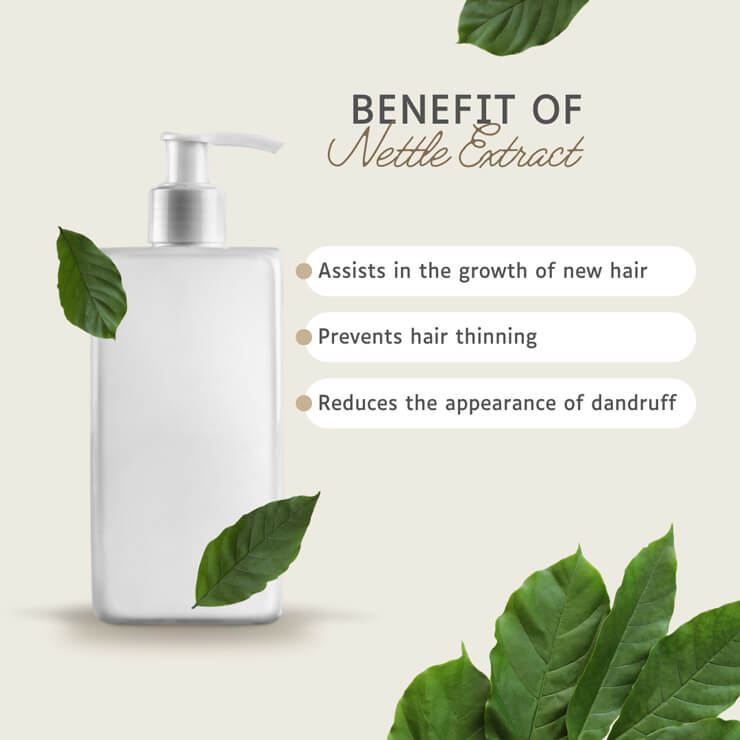Hair loss therapy using nettle extract is becoming more popular. Many people of all ages and walks of life suffer from hair loss. Some causes are irreversible, but the majority of the time, this issue can be resolved. Heredity, aging, poisonous compounds used in the hair, and tension are common curable reasons.
There are a variety of hair loss remedies accessible from dermatological physicians and clinics; however, many increasingly prefer natural over pharmaceutical alternatives. Natural components are undoubtedly safer than chemical wastes, as has been demonstrated numerous times. Even while utilizing natural products, however, unpleasant responses can occur. This will be covered in further detail in the final section of this paper.
The Nettle Plant
Urtica dioica, popularly known as conventional nettle, is the scientific name for stinging nettle. Since the plant has short, thin biting hair all over it, it is commonly called stinging nettle. Although it stings when it comes into touch with human flesh, it is essentially harmless. Asia, Europe, and Africa are all home to this plant. It is widespread throughout most of Asia and Europe.
Hair Loss Treatment with Stinging Nettle Extract
Assists in the growth of new hair
Stinging nettle root, as previously stated, can aid in the prevention of hair loss. But what’s even better is that it can aid in hair regeneration. In the leaves of stinging nettle, sulfur and silica are abundant. Your hair will become stronger and shinier as a result of this treatment. Hair re-growth and color restoration can both be aided by an essential practice of washing your hair with nettle extracts and then cleaning it with water.
Prevents hair thinning
The stinging nettle plant has long been used to address hair loss issues, though you may have recently found it. The stems have anti-inflammatory characteristics, which can alleviate irritation in the hair and encourage hair growth.
Stinging Nettle Root does have the capacity to prevent DHT, a substance that can harm hair cells if it is produced in excess. According to studies, nettle extract inhibits the creation of DHT by lowering the formation of the 5-alpha-reductase enzyme. To cure hair loss medically, you can take stinging nettle tablets or drink nettle tea.
Reduces the appearance of dandruff
Stinging nettle leaf extract has active chemicals that aid in the reduction of dandruff, which is yet another reason for hair loss. To get rid of dandruff, crush some raw stinging leaves and apply the liquid to your hair. Mix nettle leaves with mustard oil and massage the mixture on your scalp, you can use coconut oil instead of mustard oil.
How to Treat Baldness with Stinging Nettle?
The diversity of application of stinging nettle is perhaps the most enticing property. It’s available in both liquid and powder form. Tablets and topical treatments include stinging nettle. Because of this effect, you can utilize stinging nettle in whatever method you like. You can drink stinging nettle tea, consume it as a tablet, or massage it to your hairline. The most common uses for stinging nettle are listed below.
Hair Advantages of Nettle Tea
Nettle tea is also available. Hair development is aided by nettle tea. In a large bowl of hot water, soak dry nettles. Dry nettles, as well as cleansing herbs like antibacterial lavender and rosemary, can be added to the mix. Let three to five minutes boil before serving. The flavor of your tea will be nearly grassy and earthy.
Nettle Rinse
To prepare a nettle treatment for your hair, start by making nettle tea according to the directions. Then, to keep it fresh, add a small amount of your favorite essential oil. Peppermint is also a fantastic choice, but you can use any flavor you choose.
The dark chlorophyll liquid can be stored in the refrigerator for approximately six months. Use one or two tablespoons of this stinging nettle hair loss treatment to dampen hair before shampooing. Rub it into your scalp for about a minute, and then brush it all through your tresses. The most practical choice for hair loss advantages is to take a stinging nettle pill in tablets or capsules. If used in moderation, stinging nettle can be considered a rather safe herb.








